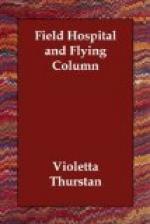It was borne in upon me during this journey what an immense country Russia is. From Torneo to Petrograd does not look far on the map, but we left Torneo on Wednesday night, and did not arrive in Petrograd till 12.30 A. M. on Saturday, about fifty-two hours’ hard travelling to cover this little track—a narrow thread, almost lost the immensity of this great Empire.
Petrograd is not one of those cities whose charms steal upon you unawares. It is immense, insistent, arresting, almost thrusting itself on your imagination. It is a city for giants to dwell in, everything is on such an enormous scale, dealt out in such careless profusion. The river, first of all, is immense; the palaces grandiose, the very blocks of which they are fashioned seem to have been hewn by Titans. The names are full of romance and mystery. The fortress of St. Peter and St. Paul, for instance, how it brings back a certain red and gold book of one’s youth, full of innocent prisoners in clanking chains confined in fetid underground dungeons. It seemed incredible to really behold its slender, golden minarets on the other side of the Neva. But this was no time for sight-seeing, we were all very anxious to get to work at once. So my first excursion in Petrograd was to the Central Bureau of the Red Cross.
The director of the Red Cross received me most kindly and promised that we should have work very soon. He suggested that in the meantime we should go and stay in a Russian Community of Sisters, who had a hospital in Petrograd. I was very glad to accept this offer for us all, for we must assimilate Russian methods and ways of thought as soon as possible, if we were to be of real use to them. Still I very much hoped that we should not be kept in Petrograd very long, as we wanted, if possible, to get nearer the front. I told the director that we had been inoculated against cholera and typhoid, and would be quite pleased to be sent to the infectious hospitals if that would be more help, as there are always plenty of people to nurse the wounded, but comparatively few who for one reason or another are able to devote themselves to this other very necessary work.
We betook ourselves without delay to the Community of Russian Sisters, and were installed in dear little cell-like rooms at the top of the house devoted to the Sisters. The other side of the house is a beautiful little hospital with several wards set apart for wounded soldiers. There are a great many similar communities in Russia—all nursing orders. They are called Sisters of Mercy, but are not nuns in any sense, as they take no vows and are free to leave whenever they like. The course of training varies from two to three years and is very complete, comprising courses in dispensing and other useful subjects. The pity of it is that there are comparatively few of these trained Sisters at the front; the vast majority of those working there have only been through a special “War Course” of two months’ training, and are apt to think that bandaging is the beginning and the end of the art of nursing.




